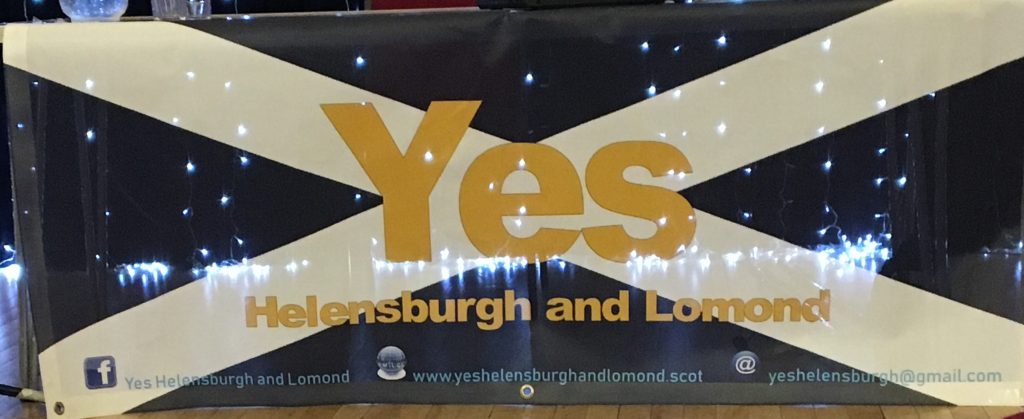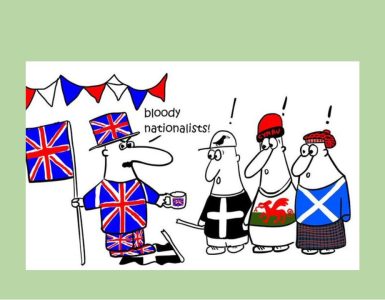I went along to Clydebank Town Hall last week for a screening of two of Lesley Riddoch’s Nation films : Faroes, the Connected Nation and Norway, the Twin Nation. The third film is Iceland, the Extreme Nation. Here they are:
[embedyt] https://www.youtube.com/embed?listType=playlist&list=PLXQBDB18CNR1mNujG60bLua8H-fzlP05S&layout=gallery[/embedyt]Lesley was at the evening so there was a question and answer session after the films. I took a few notes from the discussions which arose.
Faroes – the Connected Nation
Scotland is a sleeping giant ….. this is how some Faroese think of us
- Relationship. This was something that came out of the discussion on the Faroes film. The Faroese value relationships where everyone benefits, not deals. So when they were successful in getting Google to set up street view on Faroes and included Faroese in Google translation, everyone benefited including Google. They think in terms of making a common cause, not making deals. The Scottish Case which has just been successful in the EUCJ is a bit like that – Scottish politicians from different parties and different assemblies came together brought that about. The ability to make common cause and a basic friendliness are qualities that can be taken to the bank and deposited, as it were, with the Faroese. They trust those qualities and they see them in Scots.
- Environment. They look after it. When it became clear that their salmon farms were harming the local sea environment, they left the fjord fallow for two years to let it recover. All the employees were paid during those two years. It was necessary to protect the business in the long-term. And when they restarted they found they could sell the salmon for a lot more than before because it now had scarcity value.
Norway – the twin nation
- Long-term perspectives. Norway thinks long-term. It shows in how they decided to manage and use their oil reserves and income. UK thinks short-term, we spent our oil revenues.
- Low carbon Planning. Norway is planning for their future energy neeeds. Glasgow-based firm Star Renewable Energy are currently undertaking district heating projects in Drammen, Norway. Until recently, the efficiency of big heatpump systems was not high enough. The Drammen project demonstrates how this can now be done, delivering an 80% saving over the cost of burning gas and a much smaller carbon footprint. The Clyde has huge potential for using this technology to heat homes. As do our other estuaries. And tenements are ideal for installing district heating systems. But whereas in Norway it’s seen as the future, over here Inverclyde’s Labour controlled councilm rejected a presentation from Dave Pearson, Director of Star Renewable Energy. Another example of our short-sightedness: and so long as gas is relatively cheap and plentiful and there is no end date for new gas installations, they are not going to bother with heat exchange pumps. Holyrood does not have control over energy policy though they have managed to stop fracking in Scotland by using planning regulations which are devolved. But we do control heating policy so even before independence ScotGov could be helping heat pump schemes. In an independent Scotland we could introduce a definite end date for gas installations.
…
- High taxation. Norway is a high wage, tax, skilled country. Their petrol prices are the highest in the world. Same in Denmark. No government, whatever party, seeks to change that. Schools are all public, no private health care, elderly residential homes are sought after, kindergartens cost about £200 / month full-time. Compare that with the average cost of £230 / week in UK. High taxation works in Norway because there is also a high level of trust in their government. This level of social services sounds very akin to what Scots would want in an independent Scotland. Scots already have a higher trust in Holyrood than in is seen for Westminster in the non-Scottish parts of the UK. (SIF survey)
- Rivers Who owns the rivers and water rights? This became important in Norway when they were building hydro-electric schemes. Especially when foreign investors saw the profit potential and began buying up land. The Norwegians began by transferring outright ownership into concessions and then just reduced the length of the concessions. Just another strategy that an independent Scotland could transfer to and deal with our current situation where it’s estimated that over half of Scotland is owned by about 500 people, well people and companies. And we don’t even know who they are in some cases. There is now a Scottish Land Commission set up in 2017 by Rosanna Cunningham, Land Reform Secretary, who will carry out a study into who owns Scotland’s land and the impact that has on the people who live there.
- Oil. It’s hard not feel angry at the way Scotland’s oil and gas revenues have been squandered by UK. It’s even hard not to feel angry from a overall UK point of view, never mind a Scottish one. Norway have been very astute in how they have managed their oil reserves. We need to have a national discussion about how to proceed after independence. Yes, we have significant oil & gas reserves still but, for the sake of the planet, they may need to stay in the ground. Even if they don’t we have probably missed the boat in terms of being able to build up a big national oil fund.
- Local power & responsibility. In Norway they have local control. Norwegians are never more than 30 minutes travel from their local council centre. Whereas in UK we have a top down system. We also have very few councils often covering large areas. And all with large populations. This is a theme that I’ve hard Lesley talk about elsewhere and again it’s something that an independent Scotland could do differently.
A few international comparisons show how out of kilter Scottish local government really has become. Norway (with a population like Scotland of around five million) has 19 counties, each with an elected county council, and 431 municipalities responsible for primary and secondary education, outpatient health, senior citizen and social services, unemployment, planning, economic development and roads. The average Norwegian municipality has 12,500 people – the average Scottish council serves 162,500.
Scottish Left Review
- Renewables. This is what we should be concentrating on. Oil & gas have transportable value. On the whole renewable energies have local value. In Norway income from hydroelectric schemes stay in the local area which produced it, going to their local council to spend as they think best. They trust themselves with their revenues. We have huge renewable energy resources. There are ways to add transportable value, by using renewable electricity to hydrolyse water and using the hydrogen from that as a transportable fuel. But Norway’s local council strategy is another thing we could adopt in an independent Scotland.
As you can see there was a lot came from that evening in Clydebank Town Hall. Thanks to everyone who organised it and to Lesley Riddoch for the films and for all the effort that she puts in and the miles she travels on Scotland’s behalf.






Any chance of showing these films in Uist?
Hi,
Lesley Riddoch gives this contact email address on her website: lesley@feistyproductions.co.uk
You could email and suggest a showing on Uist. I bet she’d be up for that. Or she’d help you to it even if she couldn’t get there herself. The other option is to show them by using YouTube to stream the films through a wi-fi link.
Good luck!
I organised the event so I’m delighted you came along and enjoyed the event then produced this fantastic information resource from it. The people helping the people!